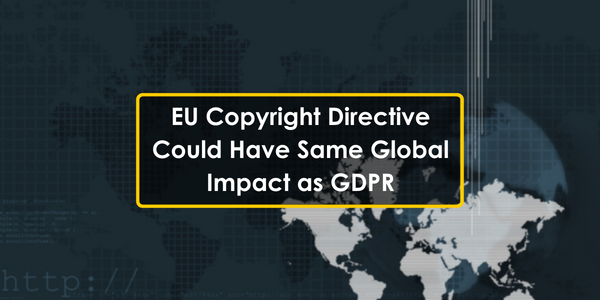Imagine if Github, a web-based platform that allows users to upload and share code, had to filter through each content upload before it was posted to ensure some part of it wasn’t already claimed by copyright holders. Imagine having to do that on your platform for each piece of public user uploaded content. That future is not far off if the European Parliament passes a copyright Directive set for a vote in mid-late June.
You may think, I’m not based in Europe so why should I care? GDPR shows us why.
U.S. businesses may not have heard of the General Data Protection Regulation (GDPR) when it was created, but they’ve certainly needed to retool their user databases and data collection practices, and probably received several “please opt-in to our mail lists, again” emails and over the past month. While the European government didn’t create the GDPR to be implemented on a global basis, businesses everywhere were forced to accommodate its standards for their European users. The GDPR principles often end up applying across the board because it’s too tedious, or maybe impossible at times, to discern users exact origin and simpler to force everyone to oblige. The European government can put a feather in their cap for that.
he same thing could happen with Article 13 of Europe’s Copyright Directive, which applies to any platform (app or website) that allows the public to upload or post content. The EU Parliament is expected to vote on this Directive in mid-June, and we’re encouraging all our members and allies to oppose Article 13 on June 12, a day of action for those potentially impacted by this unworkable legislation.
So what does Article 13 mean for developers?
Article 13 requires that any platform must maintain databases of copyrighted work that is claimed by rights-holders. Any public communications matching these databases must be blocked meaning the platform must filter through all content for copyrighted material. Automated filters are not a one-size-fits all, can you imagine the man-power needed to sort through each post? And, as Github points out, this rule applies to code and creates concerns about privacy, free speech, and ineffectiveness.
Another problem is that many entities can claim ownership of one asset, which creates a messy and difficult to navigate database that could include fraudulent material. Secondly, it’s expensive and tedious to setup and maintain. And, importantly, it makes platforms directly liable for users’ activities.
Advocates argue that these filters and databases are meant to prevent infringement, but it’s nearly impossible to put in to practice, especially for small and medium size enterprises who don’t have the staff or capital, and can’t foot the legal bills of an infringing user. To boot, rights-holders aren’t always the content creators, so are the original creators really benefiting from this protection?
As we saw with GDPR, just because you’re in the U.S. or outside of Europe doesn’t mean you’re exempt if the Copyright Directive is implemented. If you have European users, it affects you. If you’re unsure where all your users are from, it affects you. The Directive was originally created to protect the music industry and its creators, but Article 13 includes language that spans far beyond the music industry and will certainly impact developers and SMEs with European users.
We encourage you to issue a statement, engage with EU Parliament and EU Council on social media, and express your opposition to Article 13 and the impacts it could have on your software, your platform, and the success of your business.
If you have questions about engaging please reach out to us (policy@devalliance.org).





